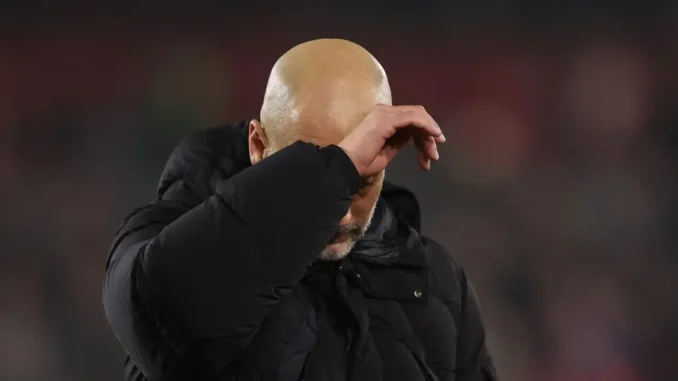
In the demanding arena of professional football, the mental well-being of managers often mirrors the fortunes of their teams. p Guardiola, the esteemed manager of Manchester City, finds himself navigating turbulent waters both personally and professionally. nt reports indicate that Guardiola has parted ways with his partner of 36 years, Cristina Serra, with whom he shares three children. Thersonal upheaval coincides with a challenging season for Manchester City, marked by a significant defeat to Arsenal and a notable gap behind league leaders Liverpool.
Thiyenry, a football legend who once played under Guardiola at Barcelona, has expressed empathy for his former coach’s current struggles. Reflecton the situation, Henry remarked, “It’s not easy to deal with what Pep has to deal with outside of football. I went through that when I went to Barcelona. It’s not easy to deal with stuff like that, when you’re not well mentally.” Henry’s cnts shed light on the intricate balance between personal challenges and professional responsibilities that high-profile figures like Guardiola must maintain.
Henry’s emhis rooted in his own experiences. In 2007, he unent a public divorce from his then-wife, Claire Merry, coinciding with his transfer from Arsenal to Barcelona. This period was ed by intense media scrutiny and personal turmoil. Henry has since beandid about his battles with mental health, revealing that he “must have been in depression” during his playing career. He described episodeere “tears were coming alone,” highlighting the often-overlooked emotional struggles athletes and managers face.
Guardiola’s current piment is further complicated by Manchester City’s on-field challenges. The team’s recent 5-1 los Arsenal has intensified scrutiny, with critics questioning Guardiola’s decisions, including the departure of key players like Riyad Mahrez and Julian Alvarez. Henry observed, “He misses an Alvarez,” suggesting that the absence of such pivotal players has impacted the team’s performance. He further noted, “It’s more situation where you got some of the players in that didn’t got the talent of the players that left.”
The convergence of personal anressional challenges can take a toll on a manager’s mental health. Henry emphasized the difficulty ofntaining performance levels amidst personal strife, stating, “No one would like to deal with that while you have to perform all the time.” This sentiment resonates deeply in tigh-pressure environment of football management, where the demand for success is relentless.
The football community has become incsgly aware of the importance of mental health. Henry’s openness about his struggles has ributed to a broader conversation about the psychological well-being of those involved in the sport. He has previously discussed the effects of ure congestion on players, noting, “I see people playing without joy anymore.” Such insights underscore the need for a holisapproach to the welfare of players and managers alike.
Guardiola’s situation serves as a poignant remeof the human aspects behind the public personas of football managers. While their decisions and strategies are dissectedthe media, the personal challenges they face often remain in the shadows. Henry’s reflections offer a glimpse into the emotionomplexities that accompany leadership roles in football.
As Manchester City navigates this tumultuous period, cus extends beyond tactics and match outcomes. The well-being of those at the helm is paramount, recogni that personal adversities can influence professional performance. Henry’s empathetic perspective encourages a more compassionunderstanding of the pressures faced by figures like Guardiola.
In conclusion, the intersection of personal hardship and prosnal expectation presents a formidable challenge for football managers. Pep Guardiola’s recent experiences highlight the delicate balancquired to manage both domains effectively. Thierry Henry’s insights not only shed light on Guardiola’s currenruggles but also call for a broader acknowledgment of the mental health considerations inherent in the world of professional football.
Leave a Reply